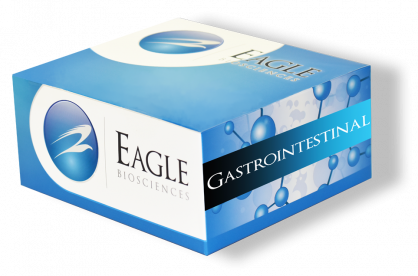CoproELISA C difficile Toxin A B Assay
The CoproELISA C difficile Toxin A B Assay is For Research Use Only
Size: 1×96 wells
Sensitivity: Cut-Off Control
Incubation Time: < 2 hours
Sample Type: Stool
Sample Size: 0.05 to 0.3g
Alternative Name: Clostridium difficile
Cross Reaction
The Eagle Biosciences CoproELISA C. difficile toxin A/B test was evaluated using microbial culture isolates and clinical stool specimens. No cross-reactivity was observed with any of the gastrointestinal pathogens and microbes listed: Blastocystis, Campylobacter, Cryptosporidium parvum, Dientamoeba fragilis, Escherichia coli, Entamoeba histolitica, Enterococcus faecali, Enterococcus faesium, Enterococcus avium, Enterococcus aerogenes, Enterococcus cloacae, Enterococcus gallinarum, Enterococcus durans, Giardia lamblia*, Helicobacter pylori*, Klebsiella pneumonia, Salmonella enterica, and Shigella.
Assay Principle
CoproELISA C. difficile Toxin A/B is an enzyme immunoassay for the detection of toxin A and toxin B in human feces. Break-apart microwells are coated with C. difficile toxin-specific polyclonal antibodies. A set of horseradish peroxidase (HRP) conjugated polyclonal anti-toxin A and anti-toxin B antibodies are added to the antibody-coated microwells. Fecal samples are diluted in sample diluent and added to the microwells. In this step C. difficile toxins are specifically marked by the HRP conjugated antibodies and immobilized by the coated antibodies. Unbound conjugate is removed by washing. Upon the addition of TMB-substrate, the substrate is hydrolyzed by the peroxidase, yielding a blue solution of the reduced substrate. Upon the addition of the stop solution, the blue color turns yellow and should be read by an ELISA reader at a wavelength of 450/620 nm. The absorbance is proportional to the level of C. difficile toxins in the sample.
Related Products
CoproELISA C difficile GDH Assay
CoproELISA H Pylori Assay Kit


